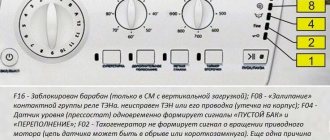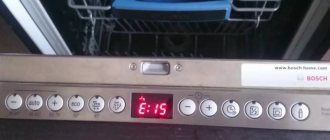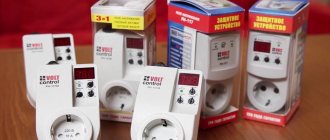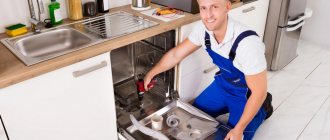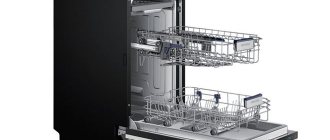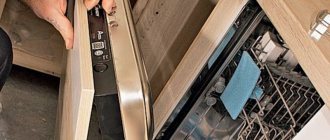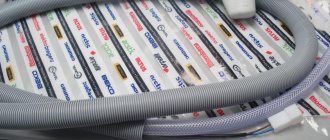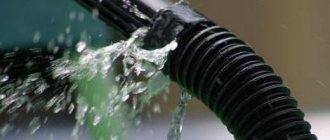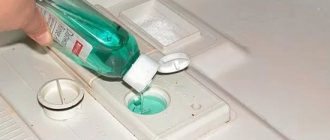No matter how carefully we treat household appliances and equipment, they all tend to break. And, as a rule, this happens at the most inopportune moment. Among other “household helpers,” dishwashers are often used. Depending on the manufacturer, operating conditions and proper use, the equipment lasts for the prescribed period or even longer. A number of reasons can cause a breakdown, as indicated by the device. So, for example, the main errors of the Korting dishwasher consist in the supply or drainage of water, failure of sensors.
Reasons for device malfunction
The main factor in failure is time. Despite the fact that the declared service life of a machine is on average 7-10 years, you can see the error code on the display much earlier. If this happens during the warranty period, the service center will send a specialist to repair it, otherwise the repair will fall on the shoulders of the owners.
Any dishwasher has a “weak spot”, as a rule, it is connected with the water supply pump. The fact is that its hardness is quite high, the presence of impurities and chlorine weakens and clogs the parts of the dishwasher. Power outages cause malfunctions in the electronics of the machine.
Manufacturers' warranties allow owners not to worry about repairs and continued serviceability of the dishwasher. But any user will need to decipher the codes. To explain the reasons for a breakdown or repair if the warranty period has expired, you should present the scale of the problem that has arisen and how to eliminate it. If the error is in the supply of washer mixture, then most likely you can fix it yourself.
Dishwasher Korting
The German brand has long been famous for its reliability and durability. Functionality and the ability to multitask are the qualities that have been appreciated on the Russian market. Users of Corting dishwashers note their reliability and full compliance with the characteristics of the device declared by the manufacturer.
New models have a convenient interface that gives the user hints about errors in operation. As soon as the machine stops functioning properly or the water pressure is not good enough for it to work, the voltage is weak, then the screen shows an error.
The operating instructions for the machine will tell you what the information on the monitor means and what to do with it. Typically, with reliable Korting technology, you don't have to worry about replacing key components. But there are errors that should be corrected in a workshop or by calling a specialist to your home.
All Korting dishwashers have a similar error indicator. If the model is an older model, without a panel, then the device will inform the owner about the problem by quickly flashing the LED light opposite any of the function start buttons.
It is worth noting that the machine will only notify you about problems that the owner can handle on his own. In other, more complex cases of errors in work, only a knowledgeable person can deal with them. Information about incorrect operation can only be obtained by typing a certain combination on the display buttons.
List and decoding of codes
Before we begin the story, I would like to warn you in advance that this time we decided to deviate a little from the usual work plan. This time we will first list and briefly decipher all the errors of Korting dishwashers, and only then move on to a detailed description of each code and the malfunctions that generated this code. So, let's begin.
- E1 - water either does not leak into the dishwasher at all, or leaks too slowly, which is detected by the control module.
- E2 – water is not removed from the dishwasher system.
- E4 – water from the dishwasher system has entered the tray.
- E8 – the level sensor incorrectly records readings and transmits them to the control module.
There are really very few codes, at least when compared with most dishwasher models that are sold on the Russian market.
Causes
When error E1 appears, you need to keep in mind two main groups of reasons: the first group is the reasons preventing the flow of water into the dishwasher and the second group is the complete absence of water or low water pressure. The check always starts with the second group of reasons, since they happen much more often. What to do? You need to open the tap in the kitchen or bathroom and check how the water flows. If there is no water, or it flows in too small a stream, then the dishwasher will not work.
In small villages, frequent water outages or pressure drops in the water supply are common. If nothing is done, the automatic washing machine or dishwasher will not work. To increase the pressure in the water supply, craftsmen install special pumps, which, by the way, are commercially available. By installing such a pump, you will forget about error E1 for a long time, unless, of course, the water is turned off completely.
Let's move on to the first group of reasons that create an obstacle to the flow of water into the machine. First of all, these are blockages. You need to turn off the water to the dishwasher, unscrew the inlet hose and find a mesh filter at its base. Often this filter becomes clogged and does not allow water to pass into the machine, so it must be cleaned at least once every 6 months.
You also need to check the intake valve to see if it opens completely. It happens that the valve begins to jam and does not open completely. In this case, repair does not make sense; the part must be changed. How to do it?
- Unscrew the screws of the side wall and remove it.
- We get to the intake valve and remove the chip with wires from it.
- Remove the valve mount.
- We remove the old valve and check it with an ohmmeter
- We put a new one in place of the old valve, connect the chip with wires and assemble the dishwasher.
The cause of error E1 may be the wiring connecting the control module to the inlet valve and the control module itself. The wiring can be easily checked with a multimeter, but it is better to have the control module tested by a technician.
The appearance of code E2 is due to the inability to remove the waste mixture of dirty water and detergent. What does this come from? In about half of the cases, the culprit is dirt that has clogged up in a plug in some area: in a pipe, in a pump, in a drain hose, in a siphon, in a sewer pipe. It needs to be removed from there, and then everything will be fine. In the second half of cases, spare parts such as pressure switch and pump are to blame. It is necessary to check these parts with a multimeter, find the fault and replace the burnt module.
If a water leak occurs, the machine displays error E4. The dishwasher body is designed so that the leaking water ends up in the tray. There is also a sensor with a float, which, when water gets in, is triggered and turns off the equipment. In this case, the control board reacts by displaying code E4. You can fix this problem like this:
- we check the pan, if there is water there, you need to turn off the machine and tilt it on the right side in order to drain everything that has accumulated there;
- Next, you need to check all the pipes and the bottom of the washing chamber for damage;
- Having found damage, it must be eliminated, and then lower the float of the leakage sensor;
- Next you need to assemble the machine and run a test dishwasher.
When faced with error E8, you should try to remove and check the water level sensor. Particular attention should be paid to the sensor tube. This tube has a thin hose attached to it, which should be removed and checked for blockages. The tube itself will also be checked for blockages. It is necessary to check whether the level sensor is securely fastened and whether the wires that connect it are not broken. After this, the wiring and sensor are checked with a multimeter and a final diagnosis is made - either we look further, or we change the pressure switch. You can read more about replacing the pressure switch in a dishwasher in the article of the same name.
In slightly more rare cases, the E8 error is triggered by the control module. “Glitched” firmware can generally display any error code, so you need to transfer the “capricious” part to a specialist who will competently test it.
Troubleshooting technique
We have just described the errors of the Corting dishwasher and deciphered them. One really gets the impression that the self-diagnosis system is limited. To be honest, it doesn’t even cover 25% of all possible dishwasher malfunctions, and what should you do if something breaks in the Corting machine that is not indicated by an error code? The answer is simple, you need to watch and listen to how the machine works and trust common sense.
Suppose the thermistor or heating element is broken. There is no error code for these breakdowns in the Corting self-diagnosis system, which means the machine will continue to work no matter what. Pay attention to the quality of dishwashing and what kind of water it is washed with. Surely you will understand that washing is carried out in cold water, but after that you can take measures to check the heating element and thermistor.
If, for example, water has accumulated in the washing chamber of the machine and does not flow into the system, the Korting dishwasher may stop working, but not display any error. How to fix this? You need to turn off the machine, drain the water, and then unscrew and clean the garbage filter. It is the blockage in this filter that prevents water from circulating normally.
In general, we will not list all possible defects of the Corting dishwasher; this is the topic of a separate publication. Our main task is to show that even without a self-diagnosis system, defects in a dishwasher can be recognized, but if the system helps us, then this is only a plus.
Error code and its interpretation
So, what to do if there is a slight collapse in the work of your favorite “assistant”? The first step is to reset the error. To do this, simply disconnect the machine from the power supply. This will reboot the device and allow it to clear the error code.
If the machine does not reboot and does not reset the error, then you need to contact the service. Before eliminating an obvious malfunction, specialists will analyze the operation of the device as a whole.
The four main error codes for Korting machines, signaling problems in the operation of the unit, are described in the instructions for the equipment. It is possible to cope with the error and fix the problem yourself if you have the skills to use tools.
Code E1 appeared on the display - this error means that the chamber of the Korting machine will not be able to fill with hot water due to the lack of liquid supply to the system. The reason may be an incorrect connection, a broken water level sensor, errors in the electrical wiring, or a malfunction of the digital plateau.
What to do if such an error occurs? First you need to check whether there is water in the system; the city authorities could simply turn it off during maintenance work, or the supply valve is closed directly at the connection point of the machine. There may be a blockage in the inlet filter. In this case, you should remove the weed plug yourself by unscrewing the hose from the housing and rinsing the filter under running water.
Do not rule out that the machine is connected incorrectly if this is the first time it is turned on. Kinked and pinched hoses will not be able to supply enough water, which will inevitably cause a malfunction signal.
Code E2 is an error warning that it is impossible to drain waste water. The Korting dishwasher indicates one of the problems:
- incorrect, twisted position of the drain hose, possible bending;
- clogged drainage filter: to avoid this, you should clean the dishes from solid food residues, napkins, etc.;
- drain pump malfunction;
- pump clogged;
- the code also appears when the pressure switch or triac system burns out, which should be replaced;
Before troubleshooting problems yourself, you must disconnect the machine from the power source and water supply. Flushing the drain hose and cleaning the filter are perhaps the only measures to eliminate the error. But, besides this, you need to make sure that the wiring of the machine is working properly using a multimeter. Some of the recommendations cannot be carried out with the ability to handle tools, for example, to clean the pump you need to disassemble the machine body.
The E4 code signal warns that the Korting dishwasher does not detect the water supply and is overflowing. Most likely, the float sensor failed, which caused the Aquastop system to activate. Measures to eliminate the error will include replacing worn-out pipes and gaskets, changing the sealing rubber, and diagnosing the machine’s fluid fill sensor. Also, special attention should be paid to the condition of the water supply hoses.
E8 - an error code for the flow sensor or its breakdown occurs if the machine does not perform its functions at full capacity. The reasons may be burnt out wiring, control module or broken wire connections. Also, blocking the rotation of the spray arm with dishes inside the chamber displays the E8 code on the display. Repair work consists of replacing the wiring and control module, checking the insulation inside the dishwasher.
List and decoding of codes
Before we begin the story, I would like to warn you in advance that this time we decided to deviate a little from the usual work plan. This time we will first list and briefly decipher all the errors of Korting dishwashers, and only then move on to a detailed description of each code and the malfunctions that generated this code. So, let's begin.
- E1 - water either does not leak into the dishwasher at all, or leaks too slowly, which is detected by the control module.
- E2 – water is not removed from the dishwasher system.
- E4 – water from the dishwasher system has entered the tray.
- E8 – the level sensor incorrectly records readings and transmits them to the control module.
There are really very few codes, at least when compared with most dishwasher models that are sold on the Russian market.
Causes
When error E1 appears, you need to keep in mind two main groups of reasons: the first group is the reasons preventing the flow of water into the dishwasher and the second group is the complete absence of water or low water pressure. The check always starts with the second group of reasons, since they happen much more often. What to do? You need to open the tap in the kitchen or bathroom and check how the water flows. If there is no water, or it flows in too small a stream, then the dishwasher will not work.
In small villages, frequent water outages or pressure drops in the water supply are common. If nothing is done, the automatic washing machine or dishwasher will not work. To increase the pressure in the water supply, craftsmen install special pumps, which, by the way, are commercially available. By installing such a pump, you will forget about error E1 for a long time, unless, of course, the water is turned off completely.
Let's move on to the first group of reasons that create an obstacle to the flow of water into the machine. First of all, these are blockages. You need to turn off the water to the dishwasher, unscrew the inlet hose and find a mesh filter at its base. Often this filter becomes clogged and does not allow water to pass into the machine, so it must be cleaned at least once every 6 months.
You also need to check the intake valve to see if it opens completely. It happens that the valve begins to jam and does not open completely. In this case, repair does not make sense; the part must be changed. How to do it?
- Unscrew the screws of the side wall and remove it.
- We get to the intake valve and remove the chip with wires from it.
- Remove the valve mount.
- We remove the old valve and check it with an ohmmeter
- We put a new one in place of the old valve, connect the chip with wires and assemble the dishwasher.
The cause of error E1 may be the wiring connecting the control module to the inlet valve and the control module itself. The wiring can be easily checked with a multimeter, but it is better to have the control module tested by a technician.
The appearance of code E2 is due to the inability to remove the waste mixture of dirty water and detergent. What does this come from? In about half of the cases, the culprit is dirt that has clogged up in a plug in some area: in a pipe, in a pump, in a drain hose, in a siphon, in a sewer pipe. It needs to be removed from there, and then everything will be fine. In the second half of cases, spare parts such as pressure switch and pump are to blame. It is necessary to check these parts with a multimeter, find the fault and replace the burnt module.
If a water leak occurs, the machine displays error E4. The dishwasher body is designed so that the leaking water ends up in the tray. There is also a sensor with a float, which, when water gets in, is triggered and turns off the equipment. In this case, the control board reacts by displaying code E4. You can fix this problem like this:
- we check the pan, if there is water there, you need to turn off the machine and tilt it on the right side in order to drain everything that has accumulated there;
- Next, you need to check all the pipes and the bottom of the washing chamber for damage;
- Having found damage, it must be eliminated, and then lower the float of the leakage sensor;
- Next you need to assemble the machine and run a test dishwasher.
When faced with error E8, you should try to remove and check the water level sensor. Particular attention should be paid to the sensor tube. This tube has a thin hose attached to it, which should be removed and checked for blockages. The tube itself will also be checked for blockages. It is necessary to check whether the level sensor is securely fastened and whether the wires that connect it are not broken. After this, the wiring and sensor are checked with a multimeter and a final diagnosis is made - either we look further, or we change the pressure switch. You can read more about replacing the pressure switch in a dishwasher in the article of the same name.
In slightly more rare cases, the E8 error is triggered by the control module. “Glitched” firmware can generally display any error code, so you need to transfer the “capricious” part to a specialist who will competently test it.
Troubleshooting technique
We have just described the errors of the Corting dishwasher and deciphered them. One really gets the impression that the self-diagnosis system is limited. To be honest, it doesn’t even cover 25% of all possible dishwasher malfunctions, and what should you do if something breaks in the Corting machine that is not indicated by an error code? The answer is simple, you need to watch and listen to how the machine works and trust common sense.
Suppose the thermistor or heating element is broken. There is no error code for these breakdowns in the Corting self-diagnosis system, which means the machine will continue to work no matter what. Pay attention to the quality of dishwashing and what kind of water it is washed with. Surely you will understand that washing is carried out in cold water, but after that you can take measures to check the heating element and thermistor.
If, for example, water has accumulated in the washing chamber of the machine and does not flow into the system, the Korting dishwasher may stop working, but not display any error. How to fix this? You need to turn off the machine, drain the water, and then unscrew and clean the garbage filter. It is the blockage in this filter that prevents water from circulating normally.
In general, we will not list all possible defects of the Corting dishwasher; this is the topic of a separate publication. Our main task is to show that even without a self-diagnosis system, defects in a dishwasher can be recognized, but if the system helps us, then this is only a plus.
Article source: https://mashmaster. ru/kody-oshibok-posudomoechnyx-mashin-korting/
Korting dishwasher errors: how to decipher the codes, Korting dishwasher error codes.
